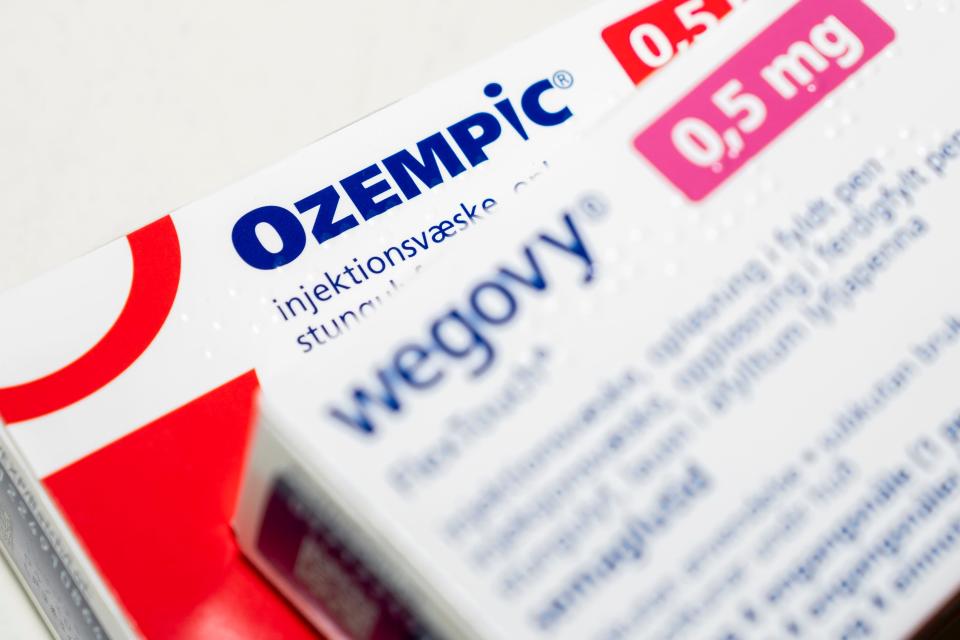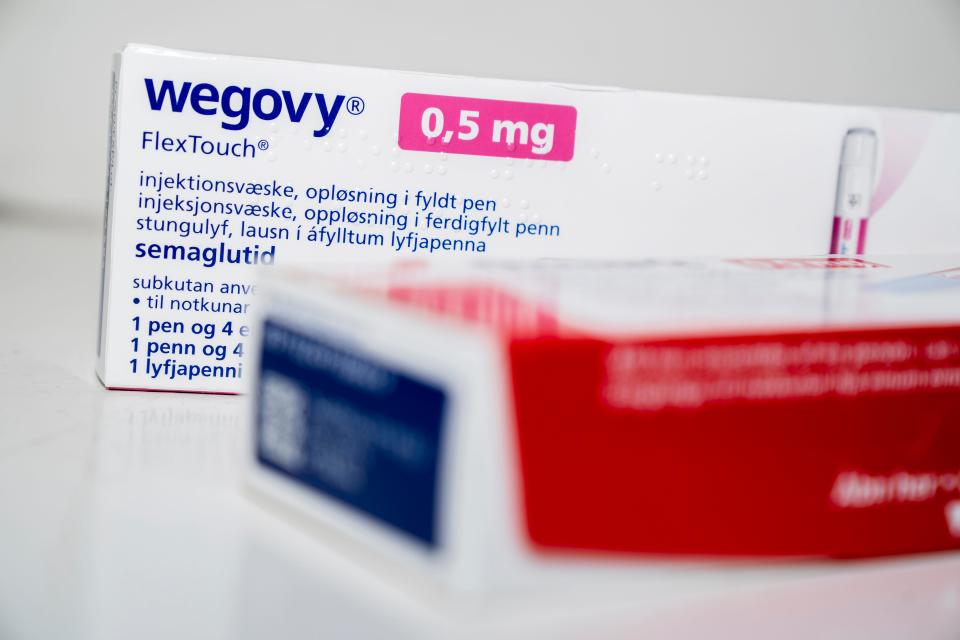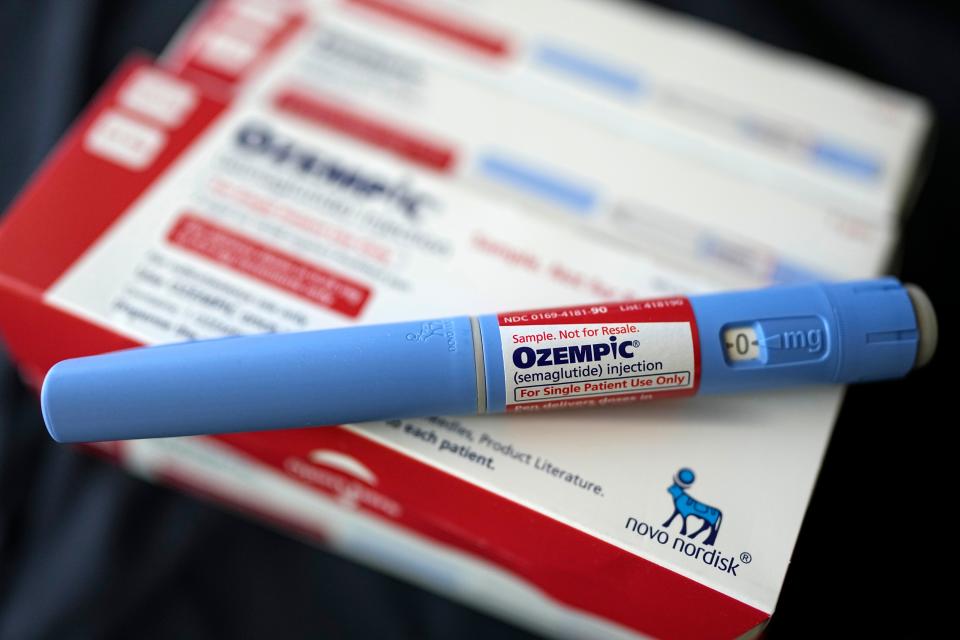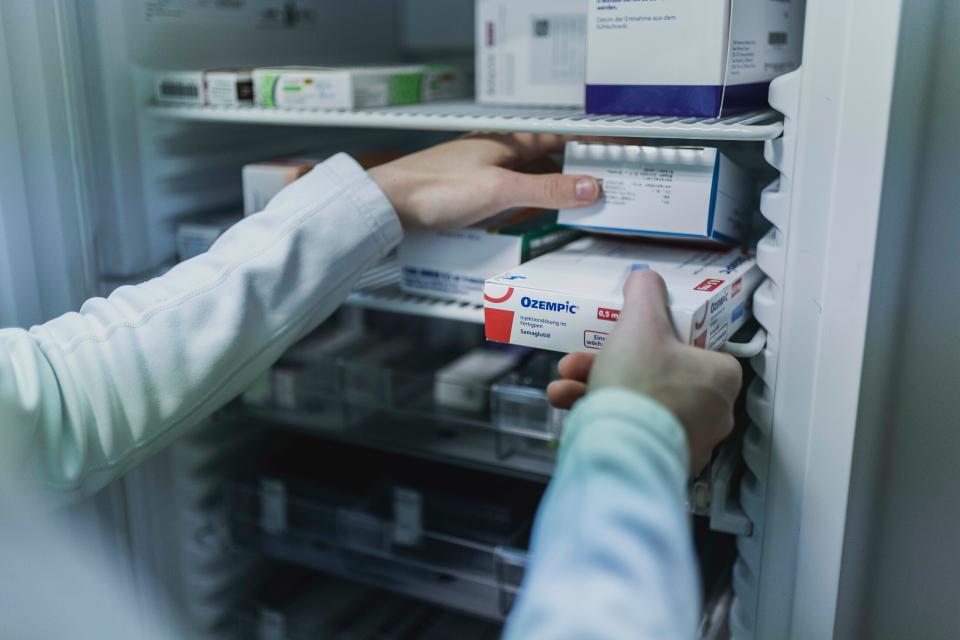What you need to know about surgery risks with weight-loss drugs Ozempic, Wegovy
You may have seen the commercials or heard about the prescription drugs Ozempic and Wegovy, used to lose weight or help manage Type 2 diabetes. Perhaps you're even considering asking your doctor about prescribing the medication.
The drugs are so popular in the U.S., where about 42% of the adult population is obese, that supply isn't keeping up with demand. The U.S. Food and Drug Administration includes both Wegovy and Ozempic on its drug shortage list.
In May, the manufacturer, Novo Nordisk, issued a statement saying that the company is trying to ramp up capacity to manufacture a more robust supply of Wegovy, but that Americans could have difficulty filling prescriptions in dosages ranging from 0.25 mg to 1 mg at least through September.

Despite these drugs' popularity, people should consider many things before taking them.
A warning was issued by the American Society of Anesthesiologists in late June about surgery risks for people who take them. And in Europe, an ongoing review is examining whether Wegovy and Ozempic, along with another weight-loss medication called Saxenda, may increase the risk of suicidal thoughts and self-injury.
The Free Press interviewed Dr. Suki Singh, the medical director of weight management and obesity medicine at Henry Ford Health System, along with Jodie Emerson, a certified nurse anesthetist and president-elect of the Michigan Association of Nurse Anesthetists, to find out what people ought to know.

How do drugs like Wegovy and Ozempic work?
The active ingredient in both drugs is identical — it's semaglutide. Both drugs also are given in weekly injections.
"Wegovy is the stronger, more concentrated version of semaglutide than Ozempic," Singh said.
Semagludtide mimics a hormone in the body called glucagon-like peptide-1. It affects parts of the brain that regulate appetite, increase the body's production of insulin, slow digestion and it can help people feel full longer.
Who is eligible for Ozempic and Wegovy?
The FDA approved Wegovy for weight loss in people with a body mass index of 27 or higher with an underlying health condition that could be improved by losing weight. The drug also was approved for use in people with a BMI of 30 or higher with no other complicating medical conditions.
"The secondary condition can be high blood pressure, pre-diabetes, diabetes, sleep apnea, arthritis and hyperlipidemia, anxiety and depression," Singh said.
"And then you have a category of patients who have a 30 BMI or above who don't have any secondary condition who also can be prescribed this medication. So even though they may not have developed that complication yet, they're en route to it.

"Someone with hyperlipidemia, for example, is at a much higher risk for something like heart disease. So why not prevent it early? That builds enough of a case with insurance companies for most to say 'OK, well, we need to treat this early and think of it as a preventative medication than something that's curative.' "
Ozempic is FDA-approved for people with Type 2 diabetes and was shown in clinical trials to reduce blood-sugar levels. Additional research found it also helped people lose weight and reduce the risk of heart attack and stroke.
"Ozempic often is covered by most insurances when patients have diabetes," Singh said.
More: Michigan hospitals plan ad campaign to entice badly needed workers
Are there other weight-loss drugs to consider?
There are several options other than Wegovy for weight loss, Singh said, and multiple other options than Ozempic for diabetes management, such as Trulicity and Mounjaro.
For oral weight-loss medications, "phentermine has been around for years," she said, and is among the most prescribed for people with obesity who haven't been able to lose weight with diet and exercise alone.

Another weight loss pill is Qsymia, which is a combination of two different oral medications — phentermine and topiramate. The third oral option is Contrave, a combination of the drugs bupropion and naltrexone.
There also is another injectable drug on the market called Saxenda. Its active ingredient is liraglutide, and it works a lot like Wegovy and Ozempic to regulate appetite by increasing production of insulin and slowing digestion to help people feel full longer.
"So in my practice, what I've learned is every patient has a different treatment plan," Singh said. "And of course, there's no one that fits all. I have patients who have done phenomenal on oral medications and have kept the weight off. And then I have patients who have gained most of it back. Again, it just comes down to what their risk factors are for weight regain.
"With the injections, I have patients that do really well with a low dose and we haven’t had a need to titrate the dose at all. Others, after two weeks, they'll say, ‘Well, I didn't notice any effect. Can we go ahead and up the dose before I see you next time?'

"So it's always important to have an open discussion with your patient. How are they doing on a medication? Are they tolerating the medication? Are they noticing any effect on their weight loss?"
More: US doctors travel to edge of war zone to care for burned Ukrainian children
How expensive are these drugs?
"When insurance plans don't cover these medications, phentermine, with a coupon on goodrx.com, can cost about $15 to $20," Singh said.
Qsymia and Contrave run anywhere between $150 to $200 a month. Wegovy and Ozempic are the higher-cost medications, so we're looking at around $1,000-plus per month. Usually, it is around $1,200-1,300."
Do insurance plans typically cover the cost of Wegovy and Ozempic?
"It’s variable," Singh said. "Most often, they'll cover Wegovy because it is FDA-approved for obesity treatment. But most often you have to do a prior authorization to let the insurance company know that a patient has a BMI of a certain level — class 1 or class 2 obesity."
Sometimes, she said, insurance companies will require patients to try less expensive, oral weight-loss drugs before they'll approve the more costly Wegovy.
Are Wegovy and Ozempic needed long-term to maintain weight loss?
"That's a difficult question to answer because we haven't used them long-term yet," Singh said. "From what we're hearing, it is something that's probably going to be long-term tool … because obesity itself is a chronic relapsing disease and it's multifactorial based on what someone's risks are.
"It's not just a consequence of unhealthy eating and lack of exercise. There are other things that are happening, whether it's an environmental factor or medication that led to increase in appetite or slower metabolism.
"That can lead to excess fat accumulation in the body, which later on develops a chronic low-grade, inflammatory environment, which can lead to other hormones being affected," Singh said. "Your neuroendocrine hormones can be affected, which in return will give you that recurrent weight gain or not being able to lose weight the way people were able to in their younger years.
"In postmenopausal women, for example, they lose muscle mass as they're going into menopause and through menopause, but no one talks about that. Often we say, well, it's just part of your hormones and you're going to gain some weight. But can we talk about remedies on how to overcome that? How should women eat differently during that time, incorporate more strength training, weight training during your menopause years, and add more low-calorie-dense foods as fill-in foods?"

In people who would like to lose 100-150 pounds, combining Wegovy or Ozempic with bariatric surgery could be the right treatment plan, she said.
"Working with a health coach and a dietitian really comes in handy because you can plug in the right foods and it can make the weight loss much more effective than just taking the medication alone and hoping for the best," Singh said.
What is the risk of taking these drugs if I'm having surgery?
Emerson, a certified nurse anesthetist, explained that the drugs slow the digestion process so your stomach remains full for longer, and it increases the risk of nausea and vomiting under anesthesia.
"With ultrasound studies, researchers started looking at gastric emptying rates while patients were taking these medications," Emerson said. "And it turned out that they saw a significant delay in the movement of food from the stomach into the small intestine."
That means the dinner you had the night before a scheduled surgery still might be sitting in your stomach when you check in at the hospital the next morning.
When a patient is given anesthesia, it can relax the lower esophageal sphincter, which usually keeps food and fluid from coming up into a person's mouth and throat. If the stomach is full, it can pass through that relaxed esophageal sphincter and be inhaled. In the lungs, it can cause aspiration pneumonia, Emerson said.
"The other issue is that fluid could come into the area around the vocal cords and it can irritate the vocal cords enough that the vocal cords can prematurely close, causing an emergency situation for an anesthesia provider," Emerson said. "It’s what we call a laryngeal spasm. … We have no way to deliver oxygen if those vocal cords are closed because they've closed off the airway.
"That's why it's so important to have an empty stomach."
Should I stop taking Wegovy or Ozempic before surgery?
The American Society of Anesthesiologists recommends stopping the drugs for at least a week before elective surgery to reduce the risk of complications.
If the patient isn't able to stop taking the drug in advance, the group recommends an ultrasound before surgery to ensure the stomach is empty.
"If the stomach is full or if the gastric ultrasound is inconclusive or not possible, consider delaying the procedure or proceed using full stomach precautions," the guidelines say. "Discuss the potential risk of regurgitation and aspiration of gastric contents with the proceduralist or surgeon and the patient."
More: U-M to begin prescription drug delivery by drone in 2024
Emerson said it is vital that patients disclose all medications they're taking prior to surgery, including over-the-counter drugs and supplements.
"What we would love the general population to know is that they really should disclose anything that they're taking," she said. "Even if it wasn't prescribed by a physician, they should tell us about the supplements they're on. Ginger, gingko biloba and garlic all can cause increased bleeding and we recommend that our patients stop taking those two weeks prior to surgery.
"So if you’re taking weight-loss drugs or supplements, even if it's not prescribed by a physician, it can have an impact on your health and safety during surgery."
What are the side effects of Ozempic and Wegovy?
The most common side effects are nausea, diarrhea, vomiting, constipation, stomach pain, headache, fatigue, indigestion, dizziness, burping, bloating and hypoglycemia, according to the FDA.
"Most of the time nausea is from hypoglycemia because patients don't feel hungry and they don't eat or they may overeat, thinking now they can accommodate more food or different kinds of food, where in reality, their stomach can't expand as much," Singh said. "So ... you get fuller on smaller portions of meals."
For people with Type 2 diabetes, there also is a chance of flatulence, intestinal infections and heartburn.
Is here anyone who shouldn't take Wegovy and Ozempic?
Anyone with an allergy to semaglutide should avoid taking Wegovy and Ozempic.
The drugs are not recommended for use in people with a personal or family history of medullary thyroid carcinoma or in patients with Multiple Endocrine Neoplasia syndrome type 2 (MEN 2).
There also is a risk of thyroid tumors, pancreatitis, gallstones, increased heart rate, low blood sugar, kidney injury and vision changes with the use of the drugs. Additionally, the FDA advises health care providers should monitor patients for a possibility of suicidal behavior and self-harm when taking these drugs.
With the shortage of these drugs, can I even get it?
"You’re at the luck of the draw if you're able to get it up at the pharmacy," Singh said.
But because Wegovy and Ozempic are on the FDA's shortage list, compounding pharmacies are able to offer a similar semaglutide compound.

"It's similar," Singh said. "You want to make sure you're going to a reputable pharmacy."
The FDA issued a warning that people should be wary.
"Some products sold as ‘semaglutide’ may not contain the same active ingredient as FDA-approved semaglutide products and may be the salt formulations. Products containing these salts, such as semaglutide sodium and semaglutide acetate, have not been shown to be safe and effective."
Why it is important to lose weight if you're obese?
"This is a critical medical condition that's originating from adipose dysfunction, fat tissue dysfunction that we're learning is increasing one's risk for 13 different types of cancers," Singh said. "So there's more risk than just diabetes and high blood pressure.
"It’s best to have an open, transparent discussion with your provider and get help."
While drugs like Wegovy and Ozempic can help, she said, it's best to have an "open discussion with the person describing it to you to talk about what your goal is, what is the cause of your weight gain and will these medications help you.
"In a lot of cases, there is a plateau one may reach and knowing that medications alone may not do the trick, but can give you a jump-start.
"Knowing you have a plan in place or putting a plan in place is really going to be key to long-term success when it comes to obesity treatment — just like you would with cancer treatment, just like you would with diabetes treatment, heart attack treatment."
Contact Kristen Shamus: kshamus@freepress.com. Subscribe to the Free Press.
This article originally appeared on Detroit Free Press: Weight-loss drugs Wegovy and Ozempic come with surgery risks

